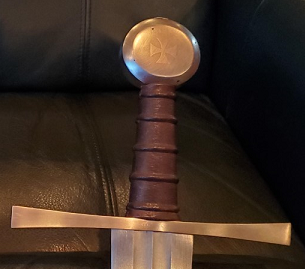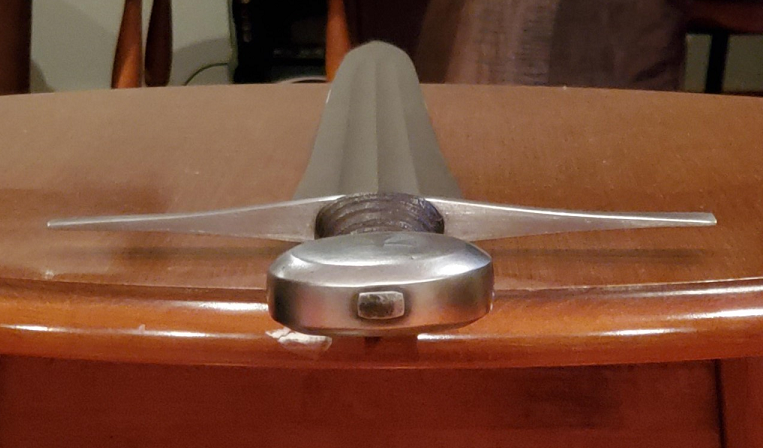I just watched this video by Dimicator/Roland Warzecha: https://youtu.be/Tv1aY1wMmyo . In this video (and some of his others), he talks about pommels twisted purposefully to fit the hand better. This video shows it on several museum swords and other videos I believe show Viking swords with the same thing. It seems to be particular to short-gripped swords where one could reasonably expect the pommel to form at least part of the grippable interface. He uses the direction of the twist to determine if it was made for someone who was right or left handed.
I find the idea fascinating. He also notes some pommels where the hole through them is off-center to fit the hand better.
Anyone else out there talking about this theory or noticing this on historical swords?
I think Roland was the first person to bring this to my attention several years ago, and since then I started noticing the twist on most wheel pommeled swords. Itís a very interesting observation, and having played around with it on some modern swords with threaded pommels, it really does feel comfortable.
HOWEVER, Iím not quite as comfortable as Roland is to assume itís automatically deliberate. Maybe it is. Maybe itís a result of the stress of use on a soft tang. I think both arguments are equally valid due to our small sample size of surviving examples. I just donít know.
HOWEVER, Iím not quite as comfortable as Roland is to assume itís automatically deliberate. Maybe it is. Maybe itís a result of the stress of use on a soft tang. I think both arguments are equally valid due to our small sample size of surviving examples. I just donít know.
It might be in Dr. Fabrice Cognot's dissertation as well. I know he's often been part of discussions I've seen in FB groups. The one I Admin for is called "Art of Weapons" and we occasionally have technical discussions. Same in All Swords and Blades of History, but I'm just a member in those. I thought I first saw it as a topic on this board some time ago. Maybe in one of the numerous discussions about hammer/handshake grips.
Fabrice's work is where I learned about the wrapped over guards and pommels, often found on Viking era and early Medieval swords both in Scandinavia and in much of so-called "Continental Europe".
The longer I participate in this hobby, the more I learn about these nuances. It's a blast!
Fabrice's work is where I learned about the wrapped over guards and pommels, often found on Viking era and early Medieval swords both in Scandinavia and in much of so-called "Continental Europe".
The longer I participate in this hobby, the more I learn about these nuances. It's a blast!
There have been different theories, like one that states that it might be an artifact from most smiths being right-handed and thereby imparting the same counter-clockwise twist when peening the pommel, with some exceptions twisted clockwise.
Personally I don't think that's the case, as IIRC we also see slots for the pommels that are canted, not just the peening. Plus the deviations appear way too strong and impactful to be accidental.
For me it makes a big difference in handling and I wouldn't have it any other way on arming swords anymore.
Personally I don't think that's the case, as IIRC we also see slots for the pommels that are canted, not just the peening. Plus the deviations appear way too strong and impactful to be accidental.
For me it makes a big difference in handling and I wouldn't have it any other way on arming swords anymore.
| Johannes Zenker wrote: |
|
Personally I don't think that's the case, as IIRC we also see slots for the pommels that are canted, not just the peening. Plus the deviations appear way too strong and impactful to be accidental. For me it makes a big difference in handling and I wouldn't have it any other way on arming swords anymore. |
Iíd love to handle one with an offset pommel and see the difference. :)
I regularly fight in Arthur Von Eschen's school with viking age weapons (related to Roland's philosophy) and have hilted a few sharps and cut with them. The offset pommel DOES make a difference, in my opinion, but it is also dependent on the pommel type or size. We can see that lots of earlier spatha types (late Roman Iron Age) don't show offset upper guards or pommel caps, but they sometimes have longer grips of 10+ cm. Shorter gripped swords sometimes have offset pommels, and sometimes they don't--smaller Oakeshott B or B1 pommels can be offset, but it doesn't seem to have as big an impact as, say, larger type As, some Petersen viking types or larger wheel pommels. You can fence just as well with or without the offset, but it is more comfortable generally to have the slight offset. It helps with straighter wrist cuts or snap cuts, and obviously with thrusts, but also with probing binds, because the meat of your hand isn't pushing your own wrist out of alignment so much. I adjusted one of my sharps with a wide type A pommel to be slightly offset, and instead of feeling like a good sword, it felt more like an extension of my arm, like a really long finger or flat hand. It helps a lot with feeling and knowing where the point is, and thus aids in point control, and also helps a bit with edge alignment, so it really shines with low-angle bind work and tip cuts, where everything kind of comes together.
In short: you don't need it, but it is really nice to have when you experience the difference, and get a chance to play with it. The offset doesn't have to be much--just a few degrees.
In short: you don't need it, but it is really nice to have when you experience the difference, and get a chance to play with it. The offset doesn't have to be much--just a few degrees.
The sword recently posted in the thread "Seems like there have been some good discoveries of late!" appears to have a twisted pommel. Have a look at the video:
https://www.youtube.com/watch?v=C3YiVctOjkw
I'm quite interested in this concept and would love to see some statistics done on the examples that we have available to us. I think a statistical study would clearly show if this is just a product of the condition of the swords or if it is intentional. I quite enjoy Roland Warzecha's work, and I am intrigued by his hypothesis, I worry that there is some confirmation bias going on in this case. I'm still interested in giving it a try though because I find swords with wide pommels very uncomfortable to extend. Perhaps just my bad grip.
https://www.youtube.com/watch?v=C3YiVctOjkw
I'm quite interested in this concept and would love to see some statistics done on the examples that we have available to us. I think a statistical study would clearly show if this is just a product of the condition of the swords or if it is intentional. I quite enjoy Roland Warzecha's work, and I am intrigued by his hypothesis, I worry that there is some confirmation bias going on in this case. I'm still interested in giving it a try though because I find swords with wide pommels very uncomfortable to extend. Perhaps just my bad grip.
Interesting find. I'd already seen that one on FB, but hadn't noticed the twisted pommel. Seems more like a hilt for two hands, in which case the cant would be highly unusual as it's not quite as beneficial and also, at least for a righty, the left hand should be nearer the pommel, which would only possibly benefit from a clockwise canted pommel. So either canted after the fact (corrosion? loose pommel?), sloppy work (unintentional cant) or a lefty's sword I guess.
I have a recent acquisition (pictured below) where the wide, flat pommel twists away from the palm. Because of this tilt it slides very comfortably into the handshake grip when desired. Conversely, it doesn't provide as much support in the hammer grip position. I suppose it's a matter of personal taste.
 Attachment: 124.04 KB
Attachment: 124.04 KB


| J.D. Crawford wrote: |
| I have a recent acquisition (pictured below) where the wide, flat pommel twists away from the palm. Because of this tilt it slides very comfortably into the handshake grip when desired. Conversely, it doesn't provide as much support in the hammer grip position. I suppose it's a matter of personal taste. |
She's a beauty! Can you share a picture from the top that shows the degree of twist on the pommel. Just curious to see it.
| Tyler C. wrote: | ||
She's a beauty! Can you share a picture from the top that shows the degree of twist on the pommel. Just curious to see it. |
Here you can see the twist of the pommel relative to the cross, which is parallel to the blade. By accident or design, its twisted in a direction friendly to right-handers. And yes, it's quite an agile and responsive sword.

Page 1 of 1
You cannot post new topics in this forumYou cannot reply to topics in this forum
You cannot edit your posts in this forum
You cannot delete your posts in this forum
You cannot vote in polls in this forum
You cannot attach files in this forum
You can download files in this forum
All contents © Copyright 2003-2006 myArmoury.com — All rights reserved
Discussion forums powered by phpBB © The phpBB Group
Switch to the Full-featured Version of the forum
Discussion forums powered by phpBB © The phpBB Group
Switch to the Full-featured Version of the forum